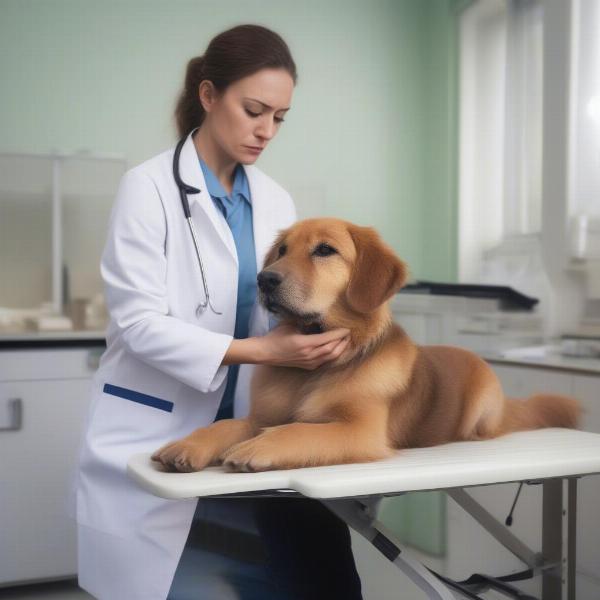The phrase “shake and dog” likely brings to mind the classic trick, but there’s much more to shaking in a dog’s life than just a paw-sitive handshake. Understanding why your dog shakes, whether from excitement, cold, fear, or a medical issue, is key to responsible pet ownership. This article will delve into the various reasons behind canine shaking, offer tips on how to differentiate between normal and concerning shakes, and guide you in seeking appropriate veterinary care when necessary.
Why Does My Dog Shake?
Dogs shake for a variety of reasons, ranging from perfectly normal to potentially serious health concerns. Knowing the common causes can help you determine if your dog’s shaking is cause for alarm.
Excitement and Joy
Perhaps the most common reason for a dog to shake is pure, unadulterated joy. Seeing you after a long day, anticipating a walk, or the thrill of a favorite toy can all trigger happy shakes. This type of shaking is usually accompanied by other signs of excitement like tail wags, playful barks, and bright eyes.
Cold and Shivering
Just like us, dogs shiver when they’re cold. Small breeds, short-haired dogs, and puppies are particularly susceptible to the chill. If your dog is shaking and the temperature is low, providing a warm blanket or a cozy sweater can help.
Fear and Anxiety
Shaking can also be a sign of fear or anxiety. Loud noises like thunderstorms or fireworks, unfamiliar environments, or stressful situations can trigger this response. Observe your dog’s body language for other signs of fear, such as tucked tails, flattened ears, and panting.
Medical Reasons
While many instances of shaking are benign, some can indicate underlying medical issues. Conditions like generalized tremor syndrome (GTS), epilepsy, distemper, nausea, or poisoning can cause shaking. If your dog’s shaking is persistent, severe, or accompanied by other symptoms like vomiting, diarrhea, or lethargy, consult a veterinarian immediately.
When to Worry About Your Dog Shaking
Knowing when your dog’s shaking is normal versus needing veterinary attention can be tricky. Consider the following:
- Frequency: Is the shaking occasional or constant?
- Intensity: Is it a slight tremor or violent shaking?
- Duration: How long does the shaking last?
- Accompanying symptoms: Are there other signs like vomiting, diarrhea, loss of appetite, or changes in behavior?
 Dog Shaking at the Vet
Dog Shaking at the Vet
If your dog’s shaking is frequent, intense, prolonged, or accompanied by other symptoms, a visit to the vet is crucial.
Is My Dog Shaking Just Part of Their Personality?
Some dogs are naturally more prone to shaking than others, especially smaller breeds. If your dog has always been a shaker and there are no other concerning signs, it might just be part of their personality. However, it’s always best to rule out any medical causes with a veterinarian, especially if the shaking increases or changes in any way.
Conclusion
While a simple “shake” can be a fun trick, understanding the different reasons why your dog shakes is essential for their well-being. By observing the context, frequency, and intensity of the shaking, and noting any accompanying symptoms, you can better discern between normal and potentially problematic tremors. Remember, when in doubt, consult your veterinarian. Early diagnosis and treatment are key to managing many medical conditions that can cause shaking.
FAQs
- My dog shakes when excited. Is this normal? Yes, shaking from excitement is a common and generally harmless behavior in dogs.
- My dog is shaking and vomiting. What should I do? Shaking accompanied by vomiting can indicate a serious medical issue. Contact your veterinarian immediately.
- How can I tell if my dog’s shaking is due to fear? Look for other signs of fear, like tucked tail, flattened ears, panting, and attempts to hide.
- Can medications cause shaking in dogs? Yes, certain medications can cause tremors as a side effect. Discuss any medications your dog is taking with your veterinarian.
- My senior dog has started shaking recently. What could be the cause? Shaking in older dogs can be due to various reasons, including age-related illnesses. Consult your vet for a proper diagnosis.
- My dog shakes after swimming. Is this something to worry about? Shaking after swimming is a natural reflex to dry off and is usually not a cause for concern.
- My dog shakes its head and scratches its ears. Could this be related to shaking? Head shaking and ear scratching can indicate ear infections or allergies, which are generally not related to overall body shaking. However, if your dog is also experiencing generalized tremors, consult your veterinarian.
ILM Dog is your trusted resource for all things dog-related. We offer expert advice on dog breeds, health, training, nutrition, grooming, and much more. Whether you’re a seasoned dog owner or just starting out, we’re here to help you navigate the wonderful world of canine companionship. For further information or personalized advice, contact us at [email protected] or +44 20-3965-8624. Visit ILM Dog for a wealth of resources to help you provide the best possible care for your furry friend.